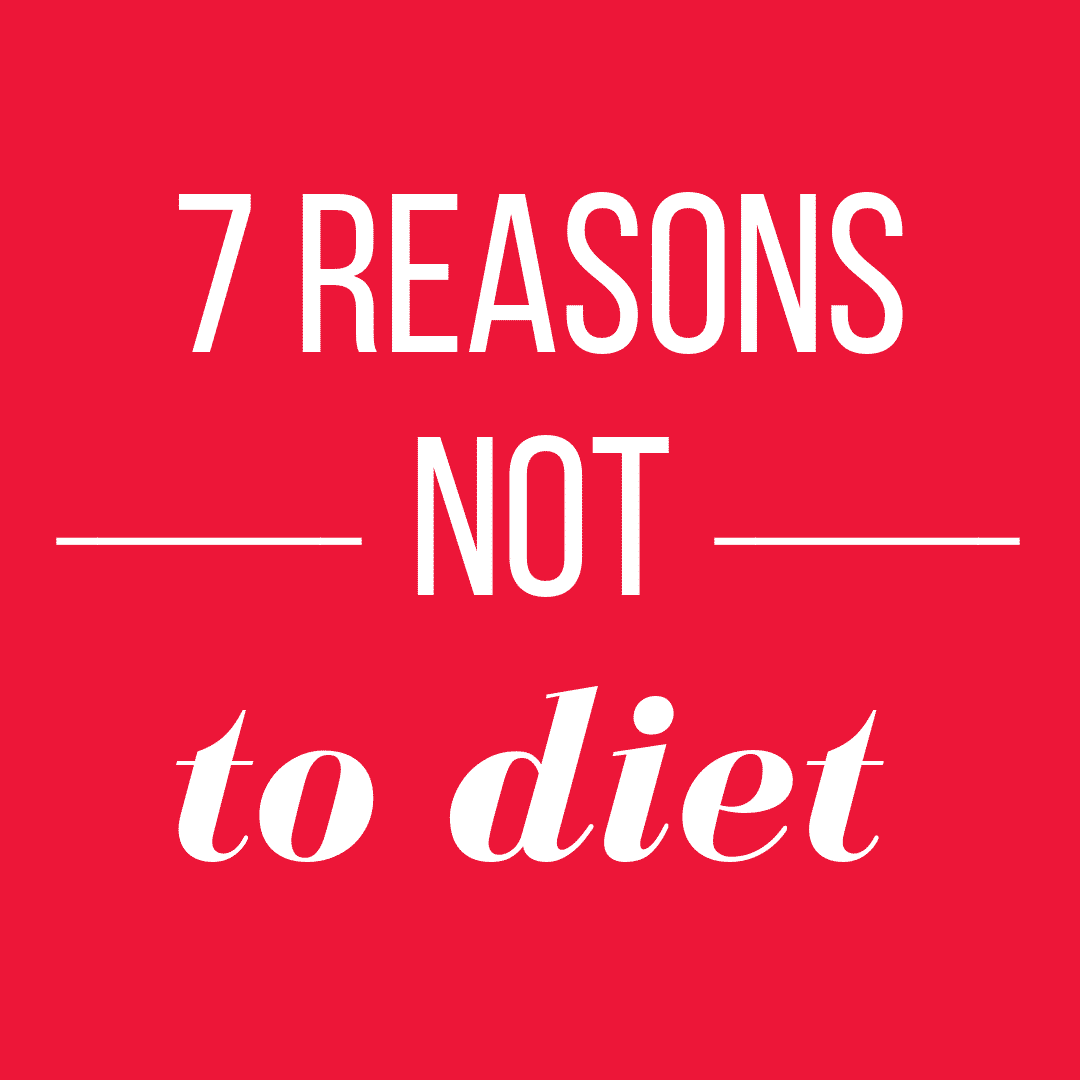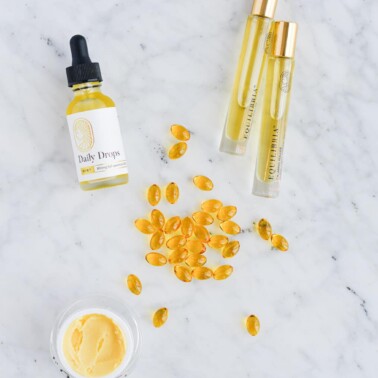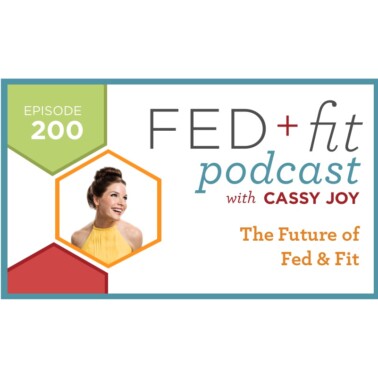Today we are talking about 7 reasons NOT to diet! January is officially here, which means diet season is in FULL swing. Even if you decided not to kick off your 2019 with a new diet, detox, or sugar cleanse, you’re probably being inundated with tons of weight loss-centric messaging that may have you second-guessing yourself. While we are all for healthy eating and exercising, here is why dieting may not be the best choice for you.

7 Reasons Not to Diet:
You’re an entirely UNIQUE individual.
Nobody looks like you, acts like you, had your upbringing, your laugh, your voice, your talents, or your preferences …which is why there’s no reason to think that an out-of-the-box NON-custom diet will work for you. It’s like trying to fit a square peg in a round hole. While some diets can serve as a great template, the only way to really know what works for you is to put the work into figuring out what works best for YOUR body.
You don’t actually want what a diet will deliver.
You want long-term results, am I right? You’re looking for a real-deal LIFESTYLE change… one that lasts. HEAR ME OUT: a diet will not guide you towards long-term results. A diet will likely result in short-term weight-loss and unless you’re EXTREMELY intentional, there’s a good chance that once it ends you’ll wind up exactly where you started within a few weeks. There are two main reasons this happens:
- The diet is only structured for the short-term. Since there is no way you can stick to a rigorous diet for life, you eventually get tired of the restriction and work that it involves and give up entirely. Diets also don’t account for real life – things like vacations, celebrations, or even busy weeks where cooking dinner just isn’t going to happen. Instead of learning how to make these things a part of your healthy lifestyle, you wind up feeling like there’s no way you can maintain healthy eating long-term.
- Restriction often leads you to think about off-limits foods even more. Have you ever done a diet and spent the whole time planning what foods you’re going to eat as part of your celebration feast as soon as its over? I know I have. While your physical cravings for foods like sugar may be quieted after giving them up, the knowledge that you can’t have certain foods builds them up in your mind and leads to a binge. You may feel guilty after the binge and vow to go back to the diet, only to have the cycle repeat itself.
Odds are, diets will actually be a detriment to your relationship with food.
If you’ve ever dieted before, you’re probably familiar with the term “cheat day.” It refers to a day that you “cheat” on your diet. The BIG (really, really big) problem here is that it sets you up to think that there are good foods and bad foods. Each kind of food you eat drops a weight onto the “good” or “bad” part of the scale. Had a dry chicken salad for lunch? Two weights on the “good” end of the scale. Had a brownie and a glass of wine after dinner? SIX weights on the bad end of the scale. You go to bed feeling like your bad decisions outweighed your good… which means that you need to “make up for it” tomorrow by either “squeaky clean eating” or an extra 30 minutes on the treadmill. Now, eating something healthy and exercising feels more like punishment than a good choice for your body.
The even bigger problem with the “good vs. bad food” concept is that it stays with you long after (years, likely even decades) the diet is over. You STILL feel guilty after ordering french fries with your burger, still feel like you’ve “cheated” yourself with that glass of red wine, still feel like you were too indulgent by ordering the fatty steak (vs. the steamed fish) at dinner. Diets give food WAY too much power. At the end of the day, food is food – not good, not bad. Some foods will work for your body and some won’t… but the foods that don’t work for you are not evil.
Dieting will drive you further away from intuitive eating.
Do you actually (I really mean actually) know when you’re hungry? How about, when you’re full? Truly thirsty (and not hungry)? In need of salt? In need of red meat, a salad, antioxidant-rich berries, or even a starchy vegetable? OR, do you look at your plate as a summary of macronutrients? Your body is far, FAR wiser than any distilled diet out there. If you learn to listen to it, it will guide you towards feeling your best. YES, it’s worth smashing certain food addictions ahead of time (sugar, alcohol, etc.), but eventually, you will get closer to your goals by eating intuitively than by dieting.
You’ll be starting a cycle that MANY PEOPLE are desperately trying to break.
In our line of work here at Fed & Fit, both as Certified Nutritionists and wellness program designers, we spend the *grand majority* of our time coaching folks who are trying to STOP DIETING. We see SO many people come through our doors who are filled with guilt and stuck in the restrict/binge cycle, for all of the reasons we’ve listed above! We promise, the reason diets aren’t working for you is NOT because you aren’t trying hard enough, don’t have any self-control, or are addicted to food. It is because diets don’t work, and they’re set up so that you HAVE to repeat them again and again!
Certain diets could have a major negative impact on adrenal and reproductive health (unless facilitated by a professional).
Ladies, the health of your adrenals (think: metabolism/energy) and/or reproductive systems (think: period regularity, fertility, etc.) are GREATLY impacted by how you nourish your bodies. Calorie restricting past a certain threshold can have a major impact on your health outside of body fat percentage – an impact that can last far longer than the momentary weight loss. Is it worth jeopardizing those parts of your health? Is it worth the potential hair loss, bone density loss, or missed periods? Extreme calorie restriction can add up, take it seriously.
You’re fueling the quick-solution obsession of our world.
I know we’re all in the same boat here – we dream of a day in the future when the pendulum swings back the other direction. When immediate gratification is no longer in-vogue, when “slow foods” beat out “fast food,” and when folks actually savored the journey of a long-term goal. That being said, let’s have a really honest heart-to-heart… supporting the quick-fix diet industry is DIRECTLY in support of our society’s current quick-fix obsession. If we want to break the cycle, slow things down, become more intentional (read: more lasting), we *must* walk the talk in all areas of our life. We need to show patience for a longer, more sustainable journey. We need to have the courage to say no to quick, smoke-in-mirror solutions. We need to stop jumping into cheap, fast-burn solutions that leave us feeling defeated, deflated, and devalued. You actually can make a difference (a big difference) by saying no to diets (all diets).
What You Can Do Instead of Dieting
Now that we’ve been over our 7 reasons NOT to diet, let’s talk about what you can do instead. Remember, we don’t give this information as a way to counter your healthy efforts, but rather to help you really think through what you want and make an informed decision from there. Here are a few ideas for how you can implement healthy changes without dieting this year:
- Assess your relationship with food. Sit down and really think about what your relationship with food looks like. Do you have a lot of “good” and “bad” foods? Do you spend a lot of time wishing you could have “off-limits” foods? Do you plan out your “cheat days” far in advance? If so, we encourage you to start erasing these food rules and instead getting in tune with what your body needs. Intuitive Eating is a great guide for this!
- Examine your relationship with your body. If you’re not feeling your best about yourself right now, we recommend checking out this article and following the included steps!
- Slow down and listen to your body’s hunger and fullness cues. Being able to tell when you are truly full and hungry, and responding accordingly, is a great first step to getting in tune with what your body is telling you.
- Journal! No, it’s not glamorous, but diligent journaling can help you figure out which food groups may be problematic for you, find out how much food makes you feel your best, and track the impact that other factors such as stress, hydration, sleep, and fitness are having on your health! You can click here to download our favorite journal template!
- Go for the low-hanging fruit and tackle rest and hydration before moving on to food and fitness. Getting enough water and sleeping well each night will do wonders for how you feel, and allow you to do the hard work of tackling the rest.












I’m in the middle of reading Intuitive Eating and I’m LOVING your posts and podcasts that encourage this. I never realized how disordered my eating was until starting to read it. I truly still am trying to figure out what true hunger feels like (before hitting the ravenous phase) and what my body cues really are. 15 years of dieting has really messed with my relationship with my body. I truly love that you’re encouraging Intuitive eating and providing tools to get to a healthy place with food. Thank you so much for this!
So, I listened to this Podcast yesterday and, yes, I completely agree! BUT, HOW do I stop the diet cycle?? I eat pretty well to begin with and work out a few times a week (or as much as my family allows!) That being said, I’d still love to lose about 10 pounds and feel great in a bathing suit this summer. How can I feel comfortable in my own skin without rules, restrictions, etc.? Do you have guidelines as to how to eat and lose weight when I am “not dieting” (at home and out at a restaurant)? Thank you! 🙂